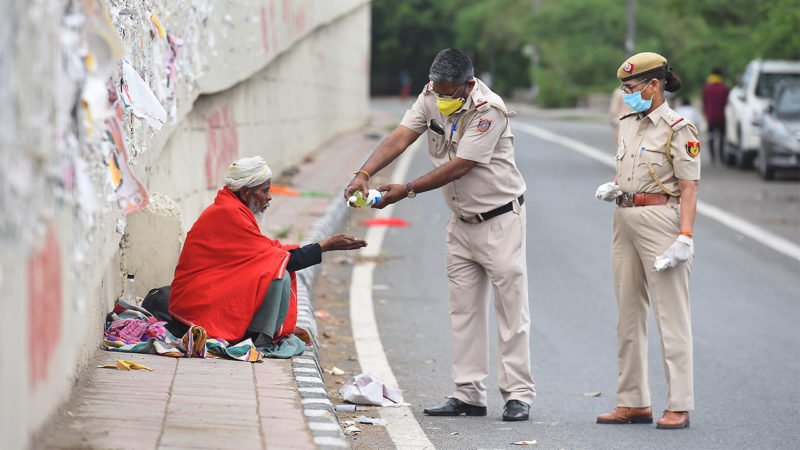Lessons India should learn from the COVID-19

For the 99% of humanity that will survive this pandemic, the post-COVID 19 world will bring long-lasting changes that would have been considered impossible earlier. The virus has wrought changes that are not just temporary but will change the world as we have known all our lives. We need to adopt changes and learn from the lessons to make the world a better place. COVID 19 is showing us the virtues of the virtual world that can be tapped by many industries once the state-imposed lockdowns end. The zoonotic virus that can spread from animals to humans and through human contact has escalated the number of positive cases and deaths at an alarming rate worldwide. This has forced the governments and health experts to enforce social distancing in several countries to break the chain of infection.
As the number of cases are escalating at an alarming rate, different measures are being adopted to contain the spread, at least till a vaccine or cure is found. No country in the world is fully prepared for epidemics or pandemics and every country has important gaps to address. Governments, businesses and public health leaders are all woefully unprepared to deal with such a pandemic. The USA spends nearly one-fifth of its GDP on health care but is failing to cope with this pandemic because resource allocation has been driven by profit and not by the safety of the masses.

COVID 19 has revealed the need to devote resources for future epidemics by creating cost-effective models to evaluate the timing and shutdowns to save lives without economic disruption. Countries also need to create healthcare systems that protect and insulate workers in foolproof ways. There needs to be a universal system of virtual medicines that can be used in lockdown so that the poorest countries can least afford to suffer the loss of medical staff. India spends barely 3% of the total GDP on its health care programs, which is extremely negligible keeping in mind the huge population and the poor state of the health sector. As per reports, India has one doctor forever 12,600 people and one ICU bed for every 84,000 people. The COVID 19 pandemic should be an eye-opener, not just the government but also the investors and business houses. A nation cannot grow until and unless its people are healthy, soundly educated and sleep on a full stomach. It is high time India invests smartly on its health sector, making ample use of the Ayushman Bharat scheme and bridging the gap in the health sector by making a smart Public-Private Partnership model. A model that doesn’t appeal to the upper class, but is also affordable by the impoverished citizens of the society. The strong leadership at the centre should realize this time that once the pandemic is over, the people will be asking some tough questions related to government-provided health care services and will need results this time more than worded promises and assurances.
The Washington Consensus and the subsequent Structural Adjustment Program (SAP) promoted by the World Bank-IMF marked a paradigm shift in the way governments and businesses operate across the world. In this order, the role of government progressively reduced and that of the market (or businesses) increased. The American economist who had an overwhelming influence on this order was Milton Friedman, a Nobel laureate (1976) often credited with the famous statement: “The business of business is business”. Firms will want to put in new internal guideline base don the lessons learnt as well as solid contingency plans in response to future crises. Nestle had rolled out virtual engagement programs, mental health initiatives, free advisory calls with accredited doctors and even check-in programs for employees who live alone or away from home. These programs will continue even after the lockdown is lifted and employee engagement will also change.
The shutdown experience will push corporate India to innovate ways to cut travel costs and reduce the costs of office spaces. This will not only improve efficiency and lower process but also yield major social benefits of which the environmental impact has been seen over the past couple of days in the form of clean air and water and improved visibility. In the services sector, companies are reworking their products to make it safer. Uber India is tweaking its cars, perhaps adding some roof to floor plastic sheeting to cordon off the drivers and protect them. There is also a mandatory protocol for sanitizing the car, including hand sanitizers for the customers. The human cost followed by the financial crunch has come as a double whammy for governments and the people. Hopefully, the pharmaceutical companies have learnt their lesson from this outbreak and will most likely try to have a more domestic outlook in the future.

The COVID 19 pandemic has forced the educational system to move online as much as possible. Online University education will enable college students to stay at home saving hugely on rent and other living expenses. Although the sudden switch from offline classes to the online mode has affected quality, but the silver lining here is that the curriculum is still followed and quality can be improved over time. In India, virtual classrooms can be expanded as has been done by a few IIM’s for the Executive MBA programs without concerns of physical space for the number of students. Also, the teachers can facilitate online discussions by breaking the class into small groups and international classes will give competition to the Indian online classes.
As Mahatma Gandhi said – “The world has enough for everyone’s needs, but not enough for everyone’s greed”, the post-COVID 19 world will only know it better. Although a lot of jobs will render irrelevant, several new ones will be created. COVID 19 has taught us the virtues of the virtual world and if We, the people can give ourselves a better and a safer future by keeping in mind the Hindu/Indian way of life, we can come out of this stronger. Greeting each other with folded hands rather than shaking hands, washing hands regularly, maintaining social distance as well as ensuring personal and public hygiene will become not just necessary, but essential for healthy existence. The Indian economy as put by the commercial branch of Axis Bank might face recession for the time in over forty years, yet the zeal of people and the work-life balance is bound to change post this global pandemic.


















